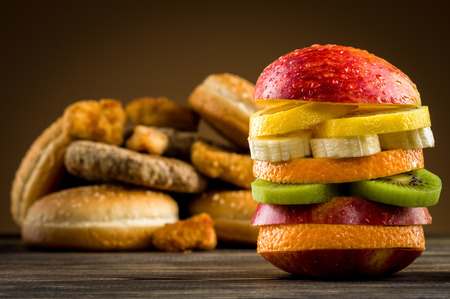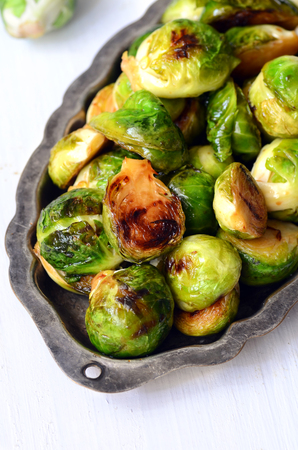I have four children; a nine year old girl, seven year old boy-girl twins, and a three year old girl. They eat well – broccoli, brussel sprouts, green beans, salads, fish, carrots, fruits for snacks. I often get asked, “How do you get your kids to eat like that? Mine would never do that! They only want mac and cheese and chicken fingers!”

Let me tell you what I was doing. Maybe it will help to see where we came from…
In 2010 I had a young three year old and one year old twins. I was working full time, breastfeeding the twins, taking on call days at the hospital (24+ hour shifts), and doing surgery. I was exhausted and in survival mode. I desperately wanted to be a good mommy, but it seemed like there was no time to do extra, and I was juggling. Can you relate?
Our routine as a family on Sunday after church was to gather all these little people up, load them into the car, and drive though a well-known burger place. We were so tired that it seemed like that was the easiest way to get the hungry tummies filled. We passed the burger place on the way home and could feed them in the car. I remember sitting in the back between the car seats, cutting up chicken nuggets with scissors dedicated for this purpose, and holding back the french fries until the chicken was gone, reasoning that the chicken was the healthier part of the meal.
Keep in mind, I never ordered any of this food for myself. I had fought too hard to lose the weight, and I knew the burger I’d order wasn’t any good for me anyway. Are you sensing the disconnect? I wouldn’t eat this stuff, but I’d feed it to my babies?
I was also in the midst of reading some books that were transforming my thinking about what food was, the sources of it, and the food industry as a whole (see list at bottom of the post). Opting out of the whole mess seemed like the way to go, but I hadn’t figured out how yet. And I was tired, so I wasn’t thinking about very much creatively.
And then I read about the butane-like substance in the breading of the chicken nuggets.
You mean I was sitting in the back of my car, blithely feeding my babies chunks of processed chicken, designed for little kids to eat, unknowingly giving them mini doses of lighter fluid with every bite?! I felt sick.
That was the last trip to the burger place.
Feeding our kids well sets them up for lifelong health. We know that what we are doing now in our children’s diet is building their bodies and palates into the adults they will become. Our childhood obesity epidemic is creating younger and younger people with type II diabetes, high cholesterol, heart disease and other inflammatory conditions.
When I was a new mom, I took the baby to the pediatrician and lamented how hard it was to listen to her cry when I was putting her to sleep. Mind you, she wasn’t being tortured, just fussing when she was being laid down for bedtime. No-nonsense Dr. Greene looked at me and said plainly, “Your first job as a parent after learning to feed the baby is to teach her to sleep well.” I never forgot that.

Teaching them to eat well comes shortly after. It starts with breastfeeding. Did you know that the flavors of the food you eat comes out in breast milk? No formula has that flavor profile! Not only is breast milk specific to YOUR baby (I like to call it designer milk), but it also tastes better than formula. Garlic and spices, all the yumminess you eat can be enjoyed by your infant! It’s rare that a food you eat can bother a baby tummy, but more likely that cow or soy milk formulas will. Yes, I’m a HUGE breastfeeding advocate (and that’ll be another post!). Now, I know that everyone can’t breastfeed, and in rare situations some women cannot. I also am aware that in the past, breastfeeding was not known to be as beneficial as we now know it to be. But now that we know that it helps develop the baby’s gut flora, jawline and teeth, decrease ear infections, increase immunity, decrease mom’s risk of breast cancer and more, we should be trying to make this work for our babies…
We think childhood is all about cupcakes and ice cream and Halloween candy, pizza and fries and burgers. But if we don’t train their little taste buds to like healthy food, then they will learn to like only the junky stuff. You know picky eater adults, don’t you?
I started with choosing my baby food intentionally. After the organic whole grain cereal of choice, I gave pureed green beans. No fruit – babies already have taste buds programmed for sugar. After I did the unsweet veggies, I tried the sweet ones – carrot, sweet potatoes, always after they ate the green beans (or whatever wasn’t sweet). We moved up to table foods from there, but I’d put the veggie on their plates first, then the starch or meat. The meal always ended with the food they’d probably wanted first. The meal was over whenever they were full. It took years before I could put a plate with everything on it and know that they’d eat what was in front of them and NOT pick out the veggies. But that’s training, right?

Another fun trick for getting my kids to eat new and unfamiliar veggies? Put them on my plate. That’s how I got them to eat beets! Whenever I’d make a beautiful plate of food, I’d always get questions. “Mommy, what are you eating? Can I have some?” I’d look like I was considering the request, thinking hard, and then I’d acquiesce. “Ok, you can have a bite. But Mommy LOVES beets, so only a small bite, ok?” They’d usually come back for more, or they’d ask to try it again the next time I made it.
Final advice: Kids learn to eat what you let them have. If you eat mostly prepared food, precooked pizza rolls out of a box, burgers and fries, instant mac and cheese, be prepared for a fight when you ask them to eat broccoli or brussels sprouts. You’re going to have to cook, at least sometimes (more about this and working full time later). And don’t cook your veggies to death! Mushy green beans are for babies, not the sophisticated and healthy palates you are trying to develop. Try roasting your broccoli and brussels – it brings sweetness to the veggie. Looking up new recipes on the internet was a gift for me. I got so many new ideas – what did we do before search engines? roasted brussels sprout recipe

Now, I’m not an anti-convenience food Nazi – well, maybe I am, a little.? Now that the kids are older, they have a slice of prepared pizza sometimes, and occasional chicken sandwich from a fast food chicken spot. But my new idea of fast food is pre-made quesadillas, cut and frozen, bagged in the freezer for when we run out of options. I have to think ahead, defrosting the chicken I want to cook, or cutting the veggies I want to grill later. I prep the onion and garlic I want to use in my saut?ed kale or swiss chard. I take apples and plantain chips in the car for emergency snacks for the kids. And sometimes, I cry uncle and we go out to eat. But not to a burger place, or anything like it. So we eat out less, ’cause it costs more. But I know that the food we eat is helping to build us into the people we want to be, healthy, energetic, and a healthy weight. I hope that eating this way is training the palate of my children to love good healthy food. And one day, our bodies will continue to be strong because of how we are caring for them now.
Helpful reading:
Animal, Vegetable, Miracle by Barbara Kingsolver
Folks, This Ain’t Normal by Joel Salatin
Fast Food Nation by Eric Schlosser
Food, Inc by Participant Media
The Omnivore’s Dilemma by Michael Pollan
Just a start….

Comments5
What a blessing to know that GOD has gifted the beautiful mother of our grandchildren with important and life sustaining information for the health of us ALL !
Thank for reading! Love you Mom Dee!
Great advice for healthy eating lifestyle!!!! Live well.
Love this one too! Just keep writing them! As you know, I am a vegan, but I still feed my little one, and husband animal products. What I am thinking, I do not know….
Love,
Nike
Don’t worry about the animal foods for your family. Actually, I’m pretty firm about not restricting any food categories in children (except sugar/processed stuff – I just struggle watching them eat that!). There are times in our lives that we need different kinds of foods, and our needs vary from person to person. For example, men often feel they need more animal foods. Quality and source of the animal foods is the critical issue, and it can be tricky. I may do my next Tea Talk on food sources, organics, GMOs…